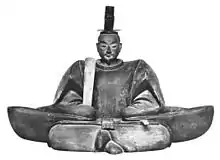Bunki
Bunki (文亀) was a Japanese era name (年号,, nengō,, lit. "year name") after Meiō and before Eishō. This period started in February 1501 and ended in February 1504.[1] During this time, the emperor was Go-Kashiwabara-tennō (後柏原天皇).[2]
Events of the Bunki era

Ashikaga Yoshitane was sent into exile in the 1st year of Bunki
- 1501 Bunki gannen (文亀元年): The era name was changed to mark the 58th year of the Chinese zodiac. The previous era ended and a new one started in 1501 (Meiō 10, 29th day of the 2nd month).
- 1501 (Bunki 1): Ashikaga Yoshitane was exiled to Suruga province.[3]
- 1502 (Bunki 2, 7th month): Minamoto-no Yoshitaka was elevated to the 2nd tier of the 4th class official in the Imperial court.[4]
- 1503 (Bunki 3): There was a great drought in the summer.[4]
Related pages
References
- Nussbaum, Louis-Frédéric. (2005). "Bunki" in Japan encyclopedia, p. 91.
- Nussbaum, "Go-Kashiwabara Tennō," p. 255; Titsingh, Isaac. (1834). Annales des empereurs du Japon, pp. 364-365.
- Titsingh, p. 364.
- Titsingh, p. 365.
Other websites
- National Diet Library, "The Japanese Calendar" -- historical overview plus illustrative images from library's collection
| Bunki | 1st | 2nd | 3rd | 4th |
|---|---|---|---|---|
| 1501 | 1502 | 1503 | 1504 |
| Preceded by: Meiō |
Era or nengō: Bunki |
Succeeded by: Eishō |
This article is issued from Wikipedia. The text is licensed under Creative Commons - Attribution - Sharealike. Additional terms may apply for the media files.